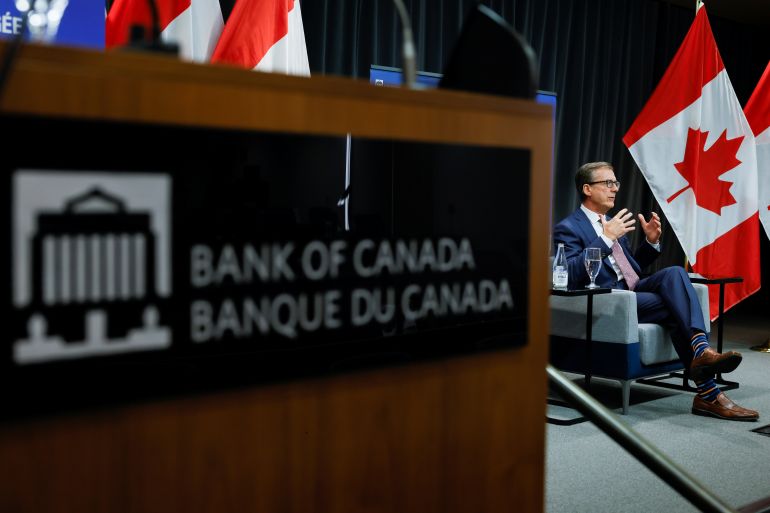Bank of Canada slashes interest rates with another jumbo cut
Bank of Canada governor also said potential tariffs by Trump posed a ‘major new uncertainty’.
US President-elect Donald Trump’s threat to impose tariffs of 25 percent on all Canadian exports has clouded the economic outlook Bank of Canada Governor Tiff Macklem said [File: Blair Gable/Reuters]Published On 11 Dec 202411 Dec 2024
The Bank of Canada has slashed its key policy rate by 50 basis points to 3.25 percent and indicated further cuts would be more gradual, in a shift from previous messaging that continuous easing was needed to support growth.
On Wednesday, Bank of Canada Governor Tiff Macklem also said for the first time that the possibility the new administration of US President-elect Donald Trump might impose tariffs on Canadian exports represented “a major new uncertainty”.
The 50-basis-point cut, while widely expected, marks the first time since the pandemic that the central bank has implemented consecutive jumbo-sized cuts.
“With the policy rate now substantially lower, we anticipate a more gradual approach to monetary policy if the economy evolves broadly as expected,” Macklem said in opening remarks to a news conference.
The bank would be evaluating the need for further cuts one decision at a time, he said, noting that monetary policy no longer needed to be clearly in restrictive territory.
The policy rate is now at the top end of the bank’s so-called neutral range, which is considered to be the band within which rates are just enough not to restrict growth but not stimulate it either.
Advertisement
Inflation is now at 2 percent, the bank’s target, and Macklem reiterated that he wanted to see growth pick up.
‘Major new uncertainty’
Canada’s economy grew at an annualised rate of just 1 percent in the third quarter, less than the Bank of Canada had predicted. The bank said fourth-quarter growth might be weaker than expected and also said planned reductions in immigration levels suggested 2025 growth might also fall short of forecasts.
Macklem also said the economic outlook was clouded by the tariffs of 25 percent on all Canadian exports to the United States promised by incoming US President Donald Trump, unless Ottawa moves to tighten the border.
“This is a major new uncertainty,” Macklem said.
As well as analysing the effect of immigration numbers, the bank will also have to take into account a temporary sales tax rebate and a possible one-time cash handout by the government.
Macklem said the bank would look through the effects that are temporary and focus on underlying trends to guide policy decisions.
With Wednesday’s reduction, the bank has now shrunk benchmark borrowing costs five times in a row by 175 basis points in a space of six months, making it the only major central bank to have reduced borrowing costs at such a rapid pace.
